Film Inquiry Recommends: Bank Heist Films
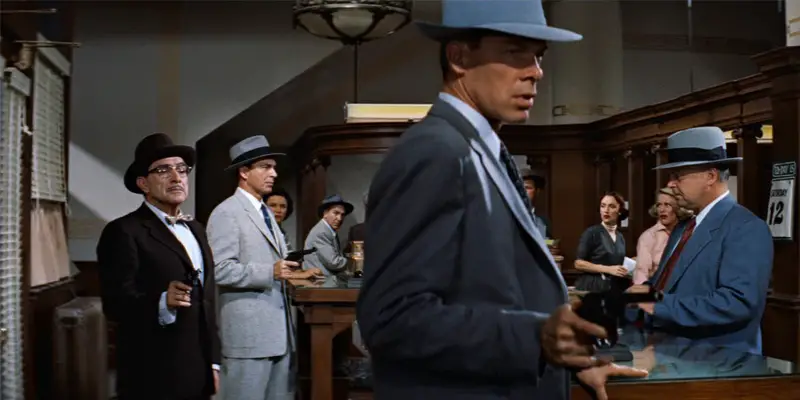
Alex is a 28 year-old West Australian who has a…
Over at our official Facebook page, we are currently posting daily film recommendations, with each week being a different theme. This is a collection of those recommendations! This week’s theme is bank heist films.
One of the many sub-genres of the action/thriller narrative catergory, the bank heist sub-genre is a heavily re-used genre that has managed to be the foundation for many great movies during the vast history of cinema, in-between the large amounts of derivative and schlocky material that it often generates.
The best known bank heist films include Spike Lee’s Inside Man, Sidney Lumet’s Dog Day Afternoon and Michael Mann’s Heat. Here is a selection of alternative but still terrific bank heist films that are worth checking out.
1. The Silent Partner (1978, Daryl Duke)
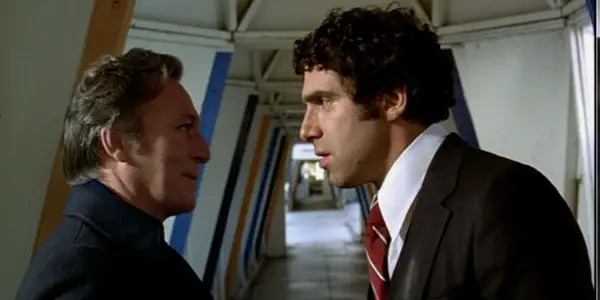
The Silent Partner is a sadly underrated bank heist film, starring cult favourite Elliot Gould and eventual Oscar winner Christopher Plummer. Directed by Daryl Duke, a small-time Canadian director who didn’t direct many other films, The Silent Partner is a tense, smart little bank heist film which has a great original premise.
A lowly bank teller, Miles Cullen (the always interesting Elliot Gould) finds out that his bank is about to be robbed (due to a discarded note), so he quickly hatches a plan. He will take a bunch of money for himself, so when the burglar comes and takes the remaining cash, Cullen will state that all the money was taken by the robber and he will get away scott-free.
When the robbery goes down and the robber, Harry (a younger Christopher Plummer) realizes that Cullen has screwed him over cash-wise, he decides to stalk and track him down. Meanwhile, Cullen enjoys his newly-acquired wealth with his co-worker Julie (Susannah York).
Whilst the main bank ‘heist’ is rather low-key and relatively simple, the film is much more concerned with the aftermath of the two key players involved. Miles starts to assert himself emotionally and financially whilst Harry starts to slowly brood and plan his comeback against the bank-teller that foiled his big plans.
The cunning cat and mouse game between this two men is a tense ride, one that Daryl Duke pulls off well. This was a Canadian production that did quite well financially and critically in Canada, it didn’t make quite the impact when it came to America, where nowadays its considered quite underrated.
Despite what the current DVD cover/poster tells you about the film (the cover implies various people being part of the plan and it being set within a large safe, neither which happen in the film), The Silent Partner is a terrific little film worth tracking down.
2. Quick Change (1990, Bill Murray, Howard Franklin)
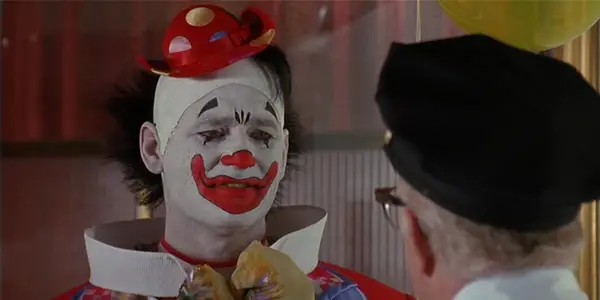
Quick Change is one of Bill Murray’s later mainstream comedies that got forgotten due to coming out the same day as the blockbuster hit Ghost, and a general lack of wide-spread marketing. The film’s release was sandwiched between Scrooged and Groundhog Day which still remain some of the biggest films of Murray’s career.
Quick Change is the only film that Murray has directed, though he shared the directing chair with Howard Franklin. Franklin is a low-key comedy director who only made three films, his final one being Larger Than Life, the mainstream comedy that caused Bill Murray to start pursuing independent cinema and to cut down on his mainstream work.
Quick Change is about three thieves, Grimm (Murray), Phyllis (Geena Davis) and Loomis (Randy Quaid, before his unfortunate personal problems) who successfully rob a bank in New York. The big problem lies with the gang trying to escape New York with the money, who keep running into continuous problems, highlighting Grimm’s growing distaste for New York City.
The always dependable Jason Robards appears as Chief Walt Rotzinger, the cop who is dead-set on tracking down the thieving trio. The supporting cast includes an incredibly strong group of comedic actors, including the late Phil Hartman, Stanley Tucci, Tony Shalhoub and Kurtwood Smith, who all play the various citizens of New York that cause problems for the gang.
Bill Murray really shines in this film, his acerbic comedic timing is just as great as it was in Ghostbusters and all his other hit movies. His sarcastic edge that won people over in the 80’s is still prevalent here, a role that’s much edgier than some of his poorer 90’s work.
The film is an interesting mix of two halves, with the first half being a quirky bank heist film, which is the easy task for the gang. The comedic flip that this film does is the trio’s drive to the airport, when the film turns into a mainstream-friendly version of Martin Scorsese’s After Hours.
Quick Change is a funny, original comedy that is still one of Murray’s more underrated films.
3. Charley Varrick (1973, Don Siegel)
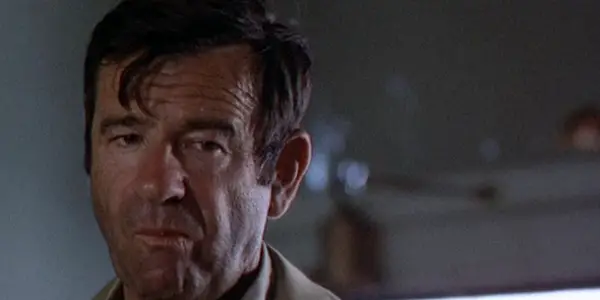
Charley Varrick tells the story of the titular character, played by Walter Matthau. Varrick is a former stunt pilot who, alongside his wife Nadine (Jacqueline Scott) and friends Al Dutcher (Fred Scheiwiller) and Harman Sullivan (Andrew Robinson) decide to rob a local bank.
Expecting a modest return from the locally-run establishment, they are shocked to receive a huge $750,000 haul. They soon learn that the bank was a safe house for the local mob, who start to hunt down the small criminal gang to exact revenge and attempt to get back their stolen money. This forces Varrick to quickly improvise a genius plan that he must enact whilst avoiding the local authorities and mob hitmen who start to kill off the members of his gang, one by one.
Charley Varrick is a film which is constantly moving, never letting the energy die down, pursuing any predictable routes for the sake of cheap story-telling. Charley is a mysterious character, never letting anyone onto what he’s about to do, as he silently schemes his improvised plan throughout the film.
Sadly, Walter Matthau hated the film, which I genuinely don’t understand. A great underrated crime thriller from the director of Dirty Harry, Charley Varrick is one of Walter Matthau’s best dramatic works, which was technically remade in 2013 as Two Guns (With Mark Wahlberg and Denzel Washington).
An affectionate fan of the film is director Quentin Tarantino, who recently expressed discontent for Pauline Kael’s initial unfavourable review of the film, stating “…She’s so rough on Don Siegel for making Charley Varrick.” His most recent film, The Hateful Eight, is stated as being inspired by the main narrative drive of this film, mixed in with Western elements inspired by The Virginian TV show.
Ving Rhames’ infamous line in Pulp Fiction: “Go to work on you with pliers and blowtorches” originated from this film, a piece of dialogue featured in one of Joe Don Baker’s terrific scenes as the hitman who is pursuing Varrick.
4. The League of Gentlemen (1960, Basil Dearden)
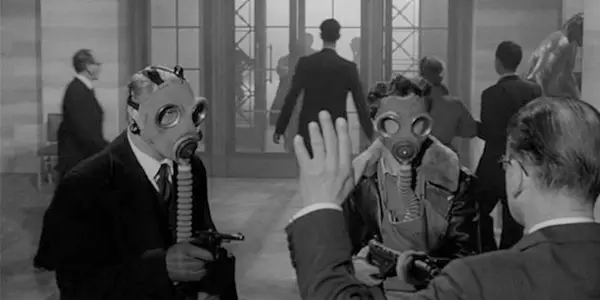
The League of Gentlemen tells the story of Norman Hyde (Jack Hawkins). Hyde is an ex-British Army member who organises a group of British Army rejects (much like The Dirty Dozen, where each member has their own unique reasons for being kicked out) to perform a bank heist, based on a robbery that he read in a book.
Bitter after being made redundant after a long and dedicated military career, Hyde decides to fight back against the British government by targeting a major British bank and deciding to take the money that he feels he deserved. The film has several shades of some contemporary films of the same theme, such as The Kill Point, Dead Presidents and Citizen Gangster.
Whilst the film doesn’t reinvent the heist genre in any way, the approach towards it makes it quite enjoyable. The classy nature of the film makes it a refreshing watch from most contemporary heists films like Ocean’s 11 or Focus. The heist plan is quite straightforward and surprisingly practical, the rapport between the group members is effective and interesting to watch. The characters clearly respect each other and there is no shoe-horned character conflicts for the sake of heightening the drama.
The only downside to the film is that due to being released in 1960, it fell under the Motion Picture Production Code, so the film’s conclusion is quite predictable and the way it goes down is quite poorly written and slightly unsatisfying. If you’re looking for an elegant British heist film featuring a classy cast of characters, I highly recommend you check out this largely forgotten film.
5. Rififi (1955, Jules Dassin)
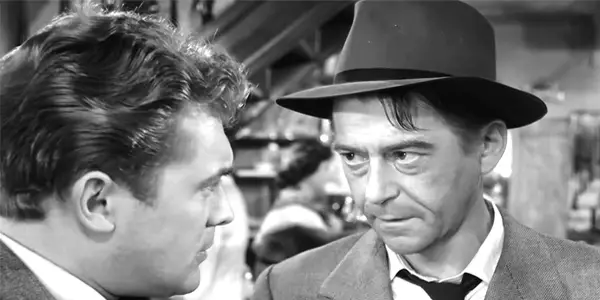
Rififi is about Tony le Stéphanois (Jean Servais), an older criminal who has just been released from a five-year sentence. Tony meets his friends Jo Le Suedois and Mario Ferrati, who invite Tony to steal a couple of jewels from the famous jewellery store Mappin & Webb Ltd, but he initially declines. After meeting with his former girlfriend Mado (Marie Sabouret), who has moved on with her own life since his departure, he decides to go through with the heist to win her back.
They invite the Italian specialist in safe-cracking, Cesar (Jules Dassin himself), to join their team and they plot a perfect heist. The heist goes well, but when Cesar starts to move the merchandise around, the wrong type of people start to take notice. The film’s commercial and critical success started Jules Dassin’s streak of directing films in Europe, a creative change that he would continue for the rest of his cinematic career.
One of the pioneering films of heist cinema, Jules Dassin’s French film noir classic Rififi is still as cracking today as it was back then. Originally helmed by Jean Pierre Melville (who would go on to make a very similar crime movie with Le Cercle Rouge), Dassin was given the job five years after being blacklisted from Hollywood.
After the success of Brute Force, The Naked City and Night and the City, the Blacklist party, due to his involvement with the USA Communist Party, targeted Dassin. Whilst not a fan of the original novel that the film was based on, Dassin took the job due to the lack of other work.
Stripping a lot of the elements from the book, Dassin was under a lot of pressure when making Rififi, due to the combination of working with a low budget, a cast of non-famous actors and a production staff who weren’t getting paid much.
Even with these problems, it’s amazing that Dassin pulled off the film, one which continues to be incredibly influential in French and crime cinema. The film’s most famous scene is the complex heist scene in the middle of the film, a 30-minute scene played completely in silence, a stunning sequence driven by increasing tension.
6. The Brink’s Job (1978, William Friedkin)
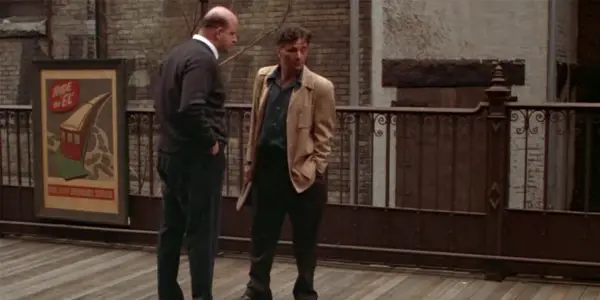
The Brink’s Job was Friedkin’s first film after Sorcerer, his ambitious remake of Wages of Fear. That film was one of the contributing failures that caused the collapse of auteur-driven cinema in the 1970’s, and the shift towards mainstream-friendly blockbusters (with other films including Michael Cimino’s Heaven’s Gate, Martin Scorsese’s New York, New York and Steven Spielberg’s 1941).
Whilst Friedkin’s earlier work was much more comedic and lighter (The Night They Raided Minsky’s and Good Times), his darker and more horror-driven films have overtaken his filmography and the general perceived imagery of his lengthy career.
The Brink’s Job is quite a departure from the work that he achieved in Sorcerer and The Exorcist, a period-set comedy that feels quite light and jolly compared to his other taut thrillers. Filled with a smorgasbord of terrific character actors, The Brink’s Job is a different take on the bank heist genre, a period film that doesn’t take itself so seriously.
Peter Falk stars as Tony Pino, a small-time crook who runs a small gang of criminals who usually rob factories and other unchallenging businesses. After a failed robbery of a farm, Pino is sent away to prison and his various gang members are sent to different jobs and crime units.
Returning from prison, Pino is forced to start from the bottom again, forming a new muddled group of criminals who are just as lousy as his first group. After a series of aborted robberies, the gang start to get ambitious about robbing The Brink’s bank, which contains a safe with millions of dollars.
Pino is shocked to find out that due to the bank’s oversight and tightness of money, they never really added any proper security to the bank’s main vault, making the safe robbery extremely easy. After a successful heist which results in millions of dollars, Pino finds that it’s harder to control his crew post-heist and getting away from the FBI, then it was doing the actual heist itself.
Originally made for genre king John Frankenheimer, William Friedkin manages to do a great job capturing the film’s old school period feel, combining modern heist tropes with the classic 1950’s aesthetic. Whilst Peter Falk will always be best known for his wise-cracking detective character of Columbo, he does some different character work here, which is always interesting to see from such a definitive television icon.
Upon retrospect, William Friedkin isn’t the biggest fan of the film, stating it “has some nice moments, despite thinly drawn characters, but it left no footprint. There’s little intensity or suspense and the humour is an acquired taste. The film doesn’t shout, it doesn’t sing – it barely whispers”.
He’s not wrong that the film isn’t the deepest things he’s ever made, but it is an entertaining take on the bank heist genre and one of the more unique outputs from a legendary director.
7. Violent Saturday (1955, Richard Fleischer)
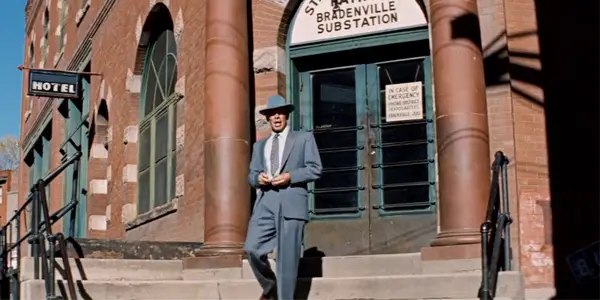
Richard Fleischer is an American genre director with one of the most diverse and underrated series of films in his vast career. Fleischer’s best known films include Fantastic Voyage, the original Doctor Dolittle, Soylent Green and Mr. Majestyk, one of the best Charles Bronson action films.
Like most school old school action directors of his time, he pumped out a large quantity of films, a mix of passion projects and studio-mandated movies that range in quality, from awesome to downright terrible. His later works consisted of a bunch of different failed sequels, such as Amityville 3D, Conan the Destroyer and Red Sonja, a series of films which soured the excellence of his earlier works.
Violent Saturday is one of his more obscure works, a real pulpy tale which combines grindhouse B-movie action with some unique narrative choices. Set within an unnamed small Southern American town, Harper (Stephen McNally), a professional bank robber, alongside his crew (which includes the psychopath Dill, played by Lee Marvin) pose as travelling salesman and enter the town.
Taking residence within the town’s only hotel, they methodically plot to rob the town’s central bank vault, watching the civilians work patterns and scheming a successful escape route. Whilst this is going on, the various residents of the town are facing their own problems, such as a businessman trying to gain the trust of his estranged son, a fleeting romance between two bank employees and a family of lone Amish people who refuse to leave their property that is wanted by various greedy businesses.
These different plot-lines all come together when Harper’s bank heist goes down, which puts the entire town in danger, leaving the depressed businessman to save the day. Violent Saturday is a film that takes its time in establishing its setting and various characters, which gives the film the weird feeling that its a protracted television pilot, rather than a proper feature film.
Nonetheless, this makes the third act pay off quite well, with each established character having some form of significant piece in the film’s main heist sequence and climactic action showdown, making the entire narrative feel quite wholesome, rather than meandering and derivative.
Whilst most home media releases hype up Lee Marvin and Ernest Borgnine’s names in the credits, this is some early work for both of these actors, who play mainly silent supporting characters amidst the large cast of actors. Violent Saturday is a distinctive and surprisingly refreshing change of pace from other action films of its day, with Fleischer directing a really wonderful shootout at the end, which is quite violent for its time period.
The film is usually lumped in with a lot of generic B-movies of its time, but it is much more than that, a noteworthy bank heist film which manages to balance character, narrative and exploitative action in a successful manner.
What are some other bank heist films that you can recommend?
Does content like this matter to you?
Become a Member and support film journalism. Unlock access to all of Film Inquiry`s great articles. Join a community of like-minded readers who are passionate about cinema - get access to our private members Network, give back to independent filmmakers, and more.













